The largest natural lake in Vietnam, Ba Be Lake, 250 kilometers north of Hanoi, enjoys cool temperatures all year round, attracting tourists in every season. Its stunning landscapes, rich biodiversity, and the vibrant culture of the local ethnic minority people fill visitors with awe.
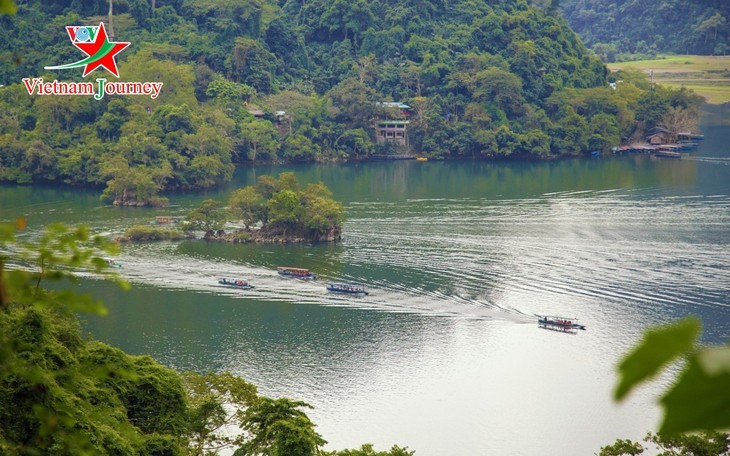
At 145m above sea level, Ba Be Lake is the largest natural freshwater lake in Vietnam.
We boarded a boat at Buoc Lom wharf on the Nang River. The boat was slowly running on the crystal, quiet water surface, passing by the mountains and green forests. The water surface is like a large mirror reflecting the sky and imprinting the beautiful mountains and forests.
Dinh Van Nghia of Nam Mau commune describes the islet we soon encountered.
“This is called ‘Widow’s Islet’. There once was a giant dragon who turned himself into an old beggar to test the kindness of the locals, but only received help from a widow and her son. That night, the dragon sprayed water and submerged the entire area, except the place where the widow and her son lived. As the water level rose, the ground around the widow’s house rose at the same rate. The widow and her son braved the heavy wind and rain to try to save the villagers, but when morning came, the land had turned into Ba Be Lake and the ground where the widow’s house stood had turned into an islet in the middle of the lake. People named it ‘Go Ba Goa’ or ‘Widow’s Islet’.”
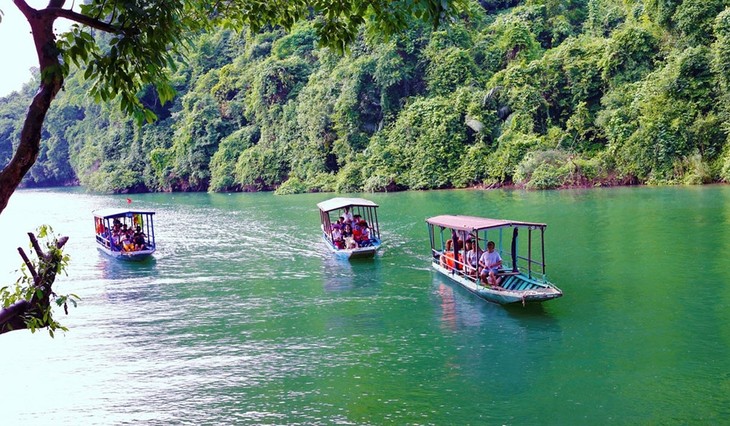
Tourists take a boat trip around the lake (Photo: VOV)
Ba Be Lake in the northern mountain province of Bac Kan was formed 200 million years ago.
Now part of Ba Be National Park, the Lake is considered one of the 20 most beautiful natural freshwater lakes in the world and has become a popular tourist attraction.
Ba Be Lake, dubbed ‘the jade of the northeastern mountains’, is famous for its geology, geomorphology, and biodiversity.
The Lake is 150 meters above sea level, 8 kilometers in length, and covers 500 hectares. It is surrounded by a vast limestone mountain range, with caves, streams, and underwater springs. In addition to the lake, there are at least 20 other tourist sites inside the park.
“Ba Be”, "Slam Pé" in the Tay language, means “three lakes”. It stands at the confluence of three rivers. The stunning landscape, unpolluted by car horns or dust, stirs the heart of even the most demanding visitors.
Today there are more things to do at Ba Be than paddle a canoe around the lake. Visitors can explore the vibrant culture of the Tay and Nung ethnic people. If your trip coincides with a Tay festival, you’ll be treated to some “Then” singing accompanied by the “Tinh” - a traditional stringed musical instrument - and a night market.
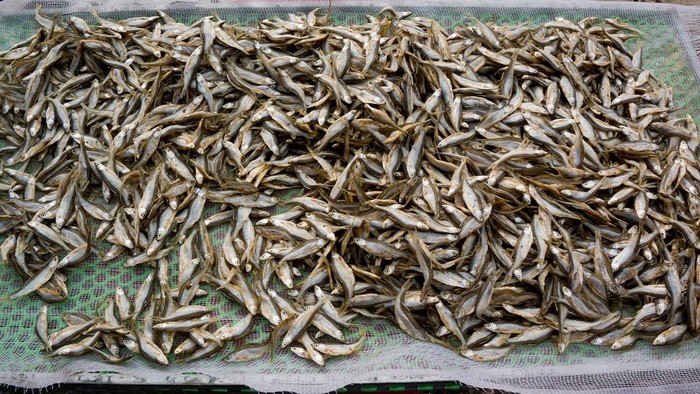
Small fish like fingers, caught in the lake and elaborately processed by the local people here, the rustic grilled fish has become a precious gift to attract visitors. (Photo: Trung Hung)
Ethnic food is a big hit at local homestays. Nguyen Thi Hang, who operates the Chi Hoa homestay, took an example, “This is grilled fresh fish. We catch the fish in the lake ourselves. This soup is made of squash, our quality farm produce that is sold in Hanoi. Fermented shrimps are a specialty of Bac Kan province. Cage-free chickens can be either grilled or fried with ginger and turmeric. All taste really good.”
Hoang Ngoc Tham, Director of the Management Board of the Ba Be Lake tourism site, says that tourists often register to stay in a homestay beside the Lake to explore the culture of indigenous people.
“The locals who live near Ba Be Lake have a rich and diverse culture. The Sli and their call-and-response singing accurately represent the life of the people who live here,” said Tham.
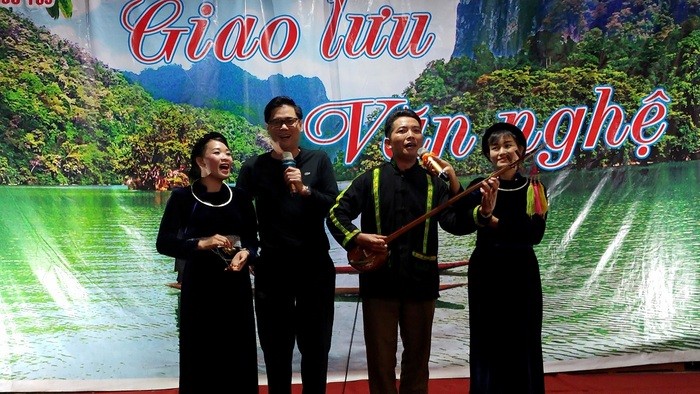
After a day of lake discovery, visitors can stay at the Tay people's community tourism villages around the lake to enjoy traditional local dishes and immerse themselves in songs full of hospitality. (Photo: Trung Hung)
Spring, summer, and early fall are all good times to visit Ba Be Lake and enjoy swimming, kayaking, fishing, trekking to nearby waterfalls, and cycling on one of the shady paths that wind through the forest.
Local tourism is still recovering from the COVID-19 pandemic. Before the pandemic, about 100,000 people a year visited Ba Be. In the first 5 months of this year, the number of visitors reached 25,000, says Tham.
Ngon Van Toan, the owner of a homestay in Pac Ngoi hamlet, whose stilt house faces Ba Be Lake, said domestic and foreign tourists are slowly returning.
“We receive many visitors on weekends, who often book accommodation and eating services depending on their needs. My family provides boat services for tourists who want to travel on Ba Be Lake. We collaborate with local Then performers to entertain tourists,” said Toan.
According to Tham, the Management Board of the Ba Be Lake tourism site will work with agencies to launch new tourism products.
“We’ll introduce a new tourism product to explore Tham Phay cave, considered the Son Doong of the northeast, and start offering night tourism. After a day spent exploring the lake, visitors will remain on the boats to hear Then singing and watch Widow Islet light up at night. We’ll also offer tour to Hua Mạ cave, where we’ve invested 215,000 USD in new sound and lighting systems. These new products will boost Bac Kan’s hospitality and tourism industries,” Tham explained in details.
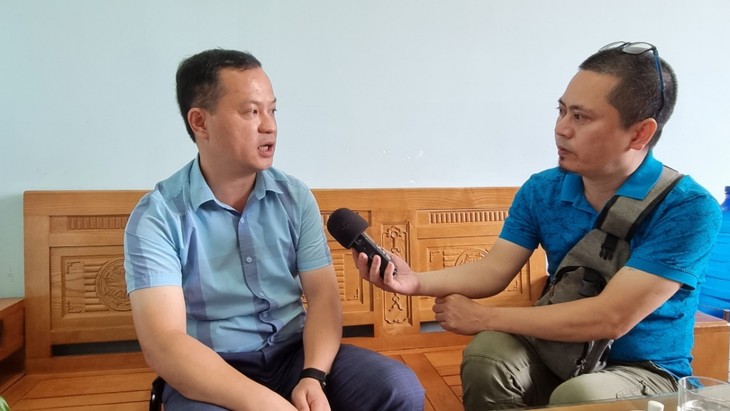
Hoang Ngoc Tham, Director of the Management Board of the Ba Be Lake tourism site (Photo: VOV2)
Since 2001, several households around Ba Be Lake have offered homestay services, but the model has been tentative and unprofessional.
Now, Tham says, Ba Be district is trying to set up one or two model homestay villages. Families in Pac Ngoi, Bo Lu, and Coc Toc hamlet are getting involved in the program.
“The district plans to give visitors a relaxed, comfortable experience in harmony with nature and the local habitants. Many female villagers, including some homestay owners, are experienced Then or Sli performers. We’ll establish additional art troupes who can demonstrate the traditional culture of local ethnic groups as we continue to develop the homestay model,” according to Tham.
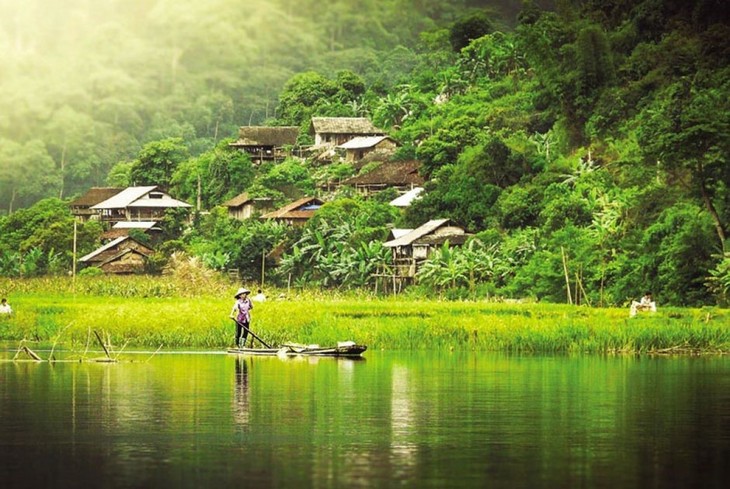
Peaceful hamlets of ethnic minority people are located by the lake. (Photo: VOV)
Bac Kan province has begun constructing a new road that will shorten the drive from Bac Kan city to Ba Be Lake by about 45 minutes instead of up to 2 hours. The central Government intends to help Bac Kan complete a new road from Cho Moi to Bac Kan city. By 2024, it will take less than 3 hours to drive from Hanoi to Ba Be. In the first quarter of next year, the 8 km road around Ba Be Lake will be repaired and upgraded.
These infrastructure improvements and projects to develop model homestay villages and guide locals in improving their facilities, communications, and services should give local tourism an enormous boost.